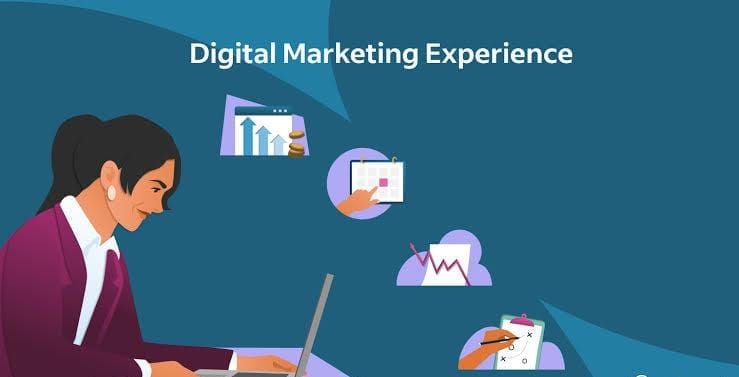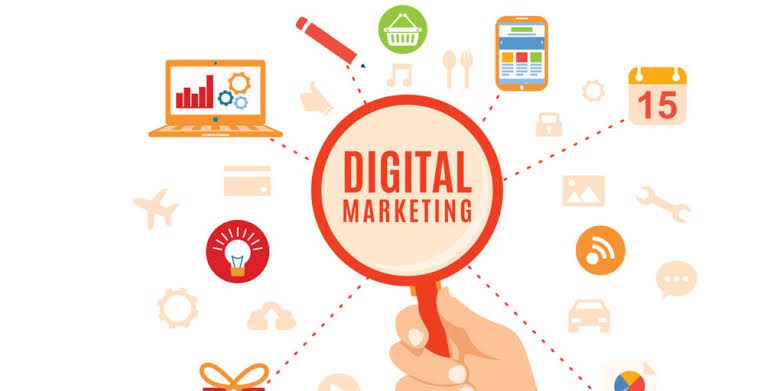A digital marketing job description typically provides a comprehensive outline of the various responsibilities associated with the role, reflecting the diversity of tasks involved in the field of digital marketing.
The nature of these responsibilities can vary depending on the position and level of experience required. For instance, a digital marketing manager job description often includes broader tasks such as overseeing multiple marketing campaigns, ensuring they align with business objectives, and leading a team.
On the other hand, a digital marketing specialist job description may delve into more specific areas, such as managing search engine optimization (SEO) strategies, pay-per-click (PPC) advertising, social media marketing, or content creation.
This distinction is important for job seekers to understand as they seek to tailor their resumes to meet the needs of specific positions. In a general digital marketing job description, the main focus is often on driving online visibility, engagement, and lead generation through various digital channels.
These channels could include social media platforms, search engines, email marketing, and websites. One key responsibility is the creation and management of content that resonates with the target audience.
Whether it is blog posts, social media updates, videos, or graphics, content creation plays a vital role in digital marketing. The goal is always to produce relevant, engaging, and high-quality content that encourages users to take a desired action, such as making a purchase, signing up for a newsletter, or following a brand on social media.
For roles focusing on SEO, a significant responsibility is optimizing website content to improve organic search rankings. This involves researching keywords, analyzing website traffic, and refining content to align with search engine algorithms.
SEO specialists work to ensure that content is discoverable, relevant, and informative, making it essential for driving free, long-term traffic to a website.
Similarly, PPC campaigns are another crucial responsibility for digital marketers, where they manage budgets, create ads, and monitor the performance of paid campaigns across platforms like Google Ads or Bing Ads.
Optimizing these campaigns for maximum return on investment is a key part of a digital marketing job description for roles that involve paid media strategies. For those looking at entry-level digital marketing positions, the job description may be more foundational.
These roles often include assisting with day-to-day tasks such as managing social media accounts, drafting content, monitoring website traffic, or supporting more senior team members in executing campaigns.
Entry-level positions can provide valuable exposure to the field, allowing individuals to learn and develop skills in various aspects of digital marketing.
In addition, digital marketing job descriptions for such roles may emphasize the importance of learning and applying industry-standard tools like Google Analytics, HubSpot, or Mailchimp, which are commonly used to track and manage digital marketing activities.
Career development in digital marketing is supported by specialized job descriptions that cater to individuals with more advanced knowledge and experience.
After completing a digital marketing course, such as the Google digital marketing course, candidates can expect to be qualified for positions that require more strategic involvement.
These positions may include roles such as digital marketing strategist or digital marketing analyst, where the focus shifts from execution to analysis and planning.
Professionals in these positions are responsible for developing marketing strategies that align with business goals, analyzing data to optimize campaigns, and advising teams on the best digital tools and practices to use.
Moreover, as businesses place greater emphasis on data-driven decision-making, skills in analytics, reporting, and conversion optimization become increasingly important in digital marketing job descriptions.
Another responsibility often included in digital marketing job descriptions is email marketing. Marketers are expected to create and manage email campaigns that nurture leads, inform customers, or promote special offers.
Effective email marketing involves segmenting email lists, crafting personalized messages, and analyzing the performance of each campaign to ensure maximum engagement.
Furthermore, many digital marketers are tasked with managing customer relationships through customer relationship management (CRM) systems, where they track interactions and ensure that campaigns are tailored to the needs and interests of different customer segments.
A successful digital marketer must also possess strong project management skills. Many digital marketing job descriptions highlight the need for individuals who can juggle multiple campaigns and deadlines.
The ability to coordinate with various departments, such as sales, design, and content, is crucial to executing successful marketing strategies. Digital marketing professionals often need to work cross-functionally to ensure that campaigns are launched on time, within budget, and achieve the desired outcomes.
Effective communication and collaboration are essential skills, as digital marketing often involves working with creative teams to develop content, analyze campaign performance, and report findings to senior management.
Another important aspect of many digital marketing job descriptions is the use of marketing automation tools. These tools help streamline repetitive tasks such as email marketing, social media scheduling, and lead nurturing.
A marketer who is proficient in using automation tools can save time and improve the efficiency of marketing efforts. Familiarity with platforms like Hootsuite, Marketo, or Salesforce is often mentioned in job descriptions as a desired skill.
In addition to technical skills, digital marketers must also have a deep understanding of the target audience. Understanding customer behavior, market trends, and competitors’ strategies is key to crafting effective marketing campaigns.
As digital marketing is an ever-evolving field, the ability to stay updated with the latest trends and adapt strategies accordingly is a crucial responsibility outlined in most digital marketing job descriptions.
Whether it involves leveraging emerging technologies like artificial intelligence, influencer marketing, or voice search, digital marketers must continuously innovate to stay ahead of the competition.
For individuals considering a career in digital marketing or those who have recently completed a course, the job description can be a valuable resource. It provides insight into the specific tasks that will be expected, the skills that will be utilized, and the professional growth opportunities available.
As the digital landscape continues to evolve, so too do the responsibilities and skills required in digital marketing job descriptions. Whether someone is starting their journey in digital marketing or looking to advance their career, understanding these expectations is essential for success.
Read Also: How to Find Junior Digital Marketing Jobs Opportunities
Required Experience and Qualifications in a Digital Marketing Job Description

When considering a digital marketing job description, it’s essential to recognize that the responsibilities and qualifications outlined can vary depending on the specific role, the level of experience, and the focus of the position.
For instance, a digital marketing manager job description will emphasize strategic oversight of marketing campaigns, while a digital marketing specialist job description will focus on specific areas of expertise such as SEO, SEM, or content creation.
Understanding the digital marketing job description is crucial for tailoring your application and ensuring you meet the expectations laid out by potential employers.
In this article, the description provides valuable insights into the qualifications required, the day-to-day tasks expected, and the skill set needed to thrive in the role.
In the case of a digital marketing manager job description, candidates typically need to have substantial experience in developing and executing marketing strategies across various digital channels. This role often requires individuals to manage and oversee comprehensive campaigns, ensuring that they align with the company’s objectives.
A digital marketing manager job description will stress the importance of leadership skills, as managers are expected to direct teams, coordinate efforts across departments, and ensure all campaigns are executed efficiently.
They must also have strong analytical abilities to measure campaign performance, analyze data, and optimize marketing efforts. Candidates should demonstrate expertise in a wide range of digital marketing tools and platforms, such as Google Analytics, email marketing systems, and social media advertising platforms.
For those applying for entry-level positions, the digital marketing job description will be less focused on extensive experience and more on foundational skills. Entry-level roles provide a learning platform and typically require a strong understanding of basic digital marketing concepts.
A digital marketing job description for such positions may focus on tasks like assisting in content creation, managing social media accounts, and conducting keyword research for SEO campaigns.
While the technical skills required may not be as advanced, employers look for candidates who are eager to learn and possess a solid understanding of core digital marketing principles. A background in digital marketing through online courses, certifications, or internships can be beneficial for these roles.
A digital marketing specialist job description will highlight specific expertise in certain areas of digital marketing, such as search engine optimization (SEO), social media marketing, or pay-per-click (PPC) advertising.
Unlike entry-level positions, a digital marketing specialist job description typically requires candidates to have a deeper understanding of one or more marketing disciplines.
For example, an SEO specialist would need to demonstrate proficiency in on-page and off-page optimization techniques, while a PPC specialist would need to have experience managing paid advertising campaigns across various platforms, including Google Ads and Facebook Ads.
The digital marketing job description for a specialist will also likely mention the need for hands-on experience with analytical tools to assess the performance of specific campaigns, identify trends, and recommend optimizations.
An internship in digital marketing offers a great opportunity for those just starting their career in this field. An internship job description is less likely to require prior experience and is generally focused on providing exposure to various aspects of digital marketing.
Interns are typically expected to assist with daily tasks such as writing blog posts, curating content for social media, assisting with SEO audits, and helping manage digital advertising accounts.
The primary focus of a digital marketing internship job description is to enable the intern to gain practical, hands-on experience while learning from more experienced professionals.
Interns often work under the supervision of specialists or managers, learning how marketing campaigns are planned and executed while building their skills in key areas such as data analysis, content strategy, and digital advertising.
The digital marketing job description will often go beyond technical skills and include the necessary soft skills needed for success. Creativity is a crucial trait, as digital marketers must develop engaging and original content that resonates with the target audience.
Communication skills, both written and verbal, are also essential for crafting compelling messages across different channels. Marketers are expected to collaborate with other departments, such as product development and sales teams, to align marketing efforts with broader business goals.
Additionally, marketers should be able to think critically and adapt strategies based on changing trends, data insights, and customer behavior. Being able to work under pressure, meet deadlines, and manage multiple projects simultaneously is a valuable skill highlighted in many digital marketing job descriptions.
In terms of technical skills, a digital marketing job description will often specify the need for familiarity with various digital marketing platforms and tools.
Commonly mentioned tools include Google Analytics, social media management tools like Hootsuite or Buffer, email marketing platforms like Mailchimp, and content management systems (CMS) such as WordPress.
These tools enable digital marketers to track performance, analyze metrics, automate tasks, and optimize strategies to achieve better results. Experience with design tools such as Adobe Creative Suite may also be required, particularly for roles involving content creation or visual campaigns.
Educational qualifications are another important aspect of a digital marketing job description. While not always a strict requirement, employers tend to prefer candidates who have a degree in marketing, communications, business, or a related field.
In addition, certifications in specific areas of digital marketing, such as Google Analytics or HubSpot Inbound Marketing, can help candidates stand out from the competition.
Such certifications demonstrate that the candidate has taken the time to develop their skills and stay updated on industry best practices, which is increasingly important in the ever-evolving digital landscape.
As the digital marketing field continues to grow, job descriptions for digital marketing positions are also evolving to reflect new trends, tools, and technologies.
Many companies seek candidates who are familiar with emerging trends such as influencer marketing, video content creation, and voice search optimization.
Staying informed about the latest developments in digital marketing is essential for job seekers, as it shows employers that candidates are proactive and able to adapt to the changing marketing landscape.
A digital marketing job description may, therefore, include references to staying current with industry changes and continually learning new skills.
Salary, Benefits, and Working Environment in a Digital Marketing Job Description

A well-rounded digital marketing job description should offer detailed insights into various aspects of the role, including salary, benefits, and the working environment. These elements are crucial not only for attracting qualified candidates but also for setting clear expectations about what the position entails.
Salary and benefits packages often reflect the level of experience required for the position, the geographical location, and the specific responsibilities outlined in the job description.
As digital marketing is a dynamic and rapidly evolving field, understanding these factors can help candidates make informed decisions about whether a particular role aligns with their career goals.
When considering a digital marketing job description, one of the most important aspects to understand is the salary structure. Compensation for digital marketing roles can vary significantly based on several factors, including the candidate’s experience, the job’s location, and the scope of responsibilities.
For example, entry-level positions, such as digital marketing coordinators, may offer a lower starting salary compared to roles that require more expertise, such as a digital marketing manager or digital marketing strategist.
Salaries for digital marketing positions are also influenced by the demand for specific skills within the industry, such as proficiency in SEO, SEM, content creation, or data analytics.
The digital marketing job description should provide a salary range that is in line with industry standards. In many cases, employers will offer competitive pay packages that are designed to attract top talent, especially for specialized roles.
For instance, digital marketing specialists or managers, who are required to have a deeper understanding of digital marketing techniques, may be offered higher salaries compared to entry-level employees.
Candidates seeking a clearer picture of potential compensation can research salary benchmarks from reputable sources such as the Journal of Digital and Social Media Marketing or platforms like Glassdoor, where employees share their salary insights.
These resources provide useful context for understanding the compensation trends within the digital marketing industry. In addition to salary, benefits play an important role in a digital marketing job description.
Companies typically offer a variety of benefits to their employees, depending on the role, company policies, and the location of the job.
Benefits can range from traditional offerings like health insurance, retirement plans, and paid time off to more modern perks such as flexible work schedules, wellness programs, and professional development opportunities.
As digital marketing is often considered a dynamic field that requires continuous learning, employers frequently provide access to training resources, certifications, or opportunities to attend industry conferences.
This can be particularly valuable for individuals looking to advance their skills and stay up to date with the latest trends in digital marketing. The digital marketing job description should highlight the types of benefits offered and how they contribute to the overall employee experience.
For example, many digital marketing roles offer remote or hybrid work options, allowing employees to work from home or from a location of their choice.
This flexibility has become increasingly important, especially as remote work continues to be a popular trend in many industries, including digital marketing.
Offering remote work opportunities can help companies attract talent from diverse geographic locations, making it easier for them to hire skilled professionals regardless of location. The working environment is another crucial factor to consider in a digital marketing job description.
While many digital marketing roles are performed remotely or in hybrid settings, some companies may still prefer employees to work in a traditional office setting.
A positive working environment fosters collaboration, creativity, and a sense of belonging, which are all essential components for a successful digital marketing team.
When describing the working environment, companies may highlight the use of modern tools and technologies that enable efficient collaboration across teams.
For instance, digital marketing teams often use tools like Slack, Trello, or Asana for project management, communication, and task tracking. These platforms help streamline workflows and ensure that everyone is on the same page when executing marketing campaigns.
In addition to technology, the work culture within a company is often reflected in the digital marketing job description. Companies may describe their culture as innovative, collaborative, or fast-paced, depending on the nature of the work.
For instance, a company that is focused on creating cutting-edge digital campaigns may highlight the creative freedom and autonomy granted to its employees. Alternatively, a company that is more focused on data-driven marketing may emphasize a culture that values analytics and results.
The digital marketing job description should provide candidates with a sense of what it’s like to work in that particular organization, helping them determine if the work environment aligns with their values and work style.
Moreover, the job description should also outline the level of support and resources available to employees. For example, digital marketing teams often collaborate with other departments, such as sales, product development, or customer support.
The ability to work across different teams can help digital marketers gain insights into customer behavior and improve their campaigns. A digital marketing job description should indicate whether employees will have access to cross-functional collaboration and mentorship opportunities.
Working in a supportive, well-equipped environment can lead to greater job satisfaction and career growth. Another factor that contributes to the working environment in a digital marketing role is the opportunity for career advancement.
Many digital marketing professionals aspire to grow within the field, and the digital marketing job description should offer insight into potential career paths. For instance, an entry-level digital marketing coordinator may eventually move up to a digital marketing manager or strategist role.
The company should be clear about the opportunities for professional growth and development within the organization. Additionally, employees may be encouraged to pursue further certifications or specialized training in areas such as SEO, SEM, or data analytics to enhance their expertise and increase their earning potential.
A well-rounded digital marketing job description should also consider factors such as work-life balance. As digital marketing is often a result-driven field with tight deadlines, it’s important for companies to emphasize the importance of balancing work and personal life.
Employers that prioritize employee well-being and offer flexibility in work hours or remote work options are more likely to attract and retain top talent. The digital marketing job description should therefore reflect the company’s commitment to maintaining a healthy and balanced work environment.
Read Also: How to Start Affiliate Marketing Without a Website
Frequently Asked Questions on What a Digital Marketing Job Description Should Include

1. What should a digital marketing job description include?
A comprehensive digital marketing job description should outline key responsibilities, required skills, experience, and qualifications. It should clearly describe the day-to-day tasks, such as overseeing campaigns, managing digital platforms, creating content, and analyzing data.
Additionally, it should mention the expected level of experience, whether it’s for entry-level or senior positions, and the specific qualifications needed, such as proficiency in SEO, SEM, content creation, or data analytics.
2. How should salary and benefits be mentioned in a digital marketing job description?
A digital marketing job description should ideally include a salary range that aligns with industry standards, the role’s responsibility, and the experience level required.
Employers should also provide details about benefits such as health insurance, retirement plans, paid time off, and any other perks offered by the company.
In today’s job market, it is increasingly common to also mention benefits like remote or hybrid work options, professional development opportunities, and wellness programs.
3. Should work environment details be included?
Yes, a digital marketing job description should include information about the work environment. This can encompass the company culture, team structure, and any flexibility in the work setting, such as remote work or hybrid options.
A description of the tools used by the team, such as project management software and communication platforms, can also help candidates understand the working dynamics.
Moreover, mentioning whether the company offers a collaborative, fast-paced, or innovative work environment helps candidates assess if they fit the organization’s culture.
4. How specific should the required skills and qualifications be in a digital marketing job description?
A digital marketing job description should clearly list the required skills and qualifications, both technical and soft. Technical skills may include proficiency in digital marketing tools, SEO/SEM, social media management, and email marketing. Soft skills, such as communication, teamwork, and problem-solving, should also be included.
The job description should specify whether certifications or courses, such as those from Google Analytics, HubSpot, or similar programs, are required or preferred. For entry-level positions, the emphasis may be more on a willingness to learn and foundational skills.
5. What is the importance of specifying career growth opportunities?
Digital marketing is a rapidly evolving field, and candidates are often looking for roles that offer opportunities for professional development.
A well-rounded job description should mention any potential career growth opportunities within the organization, whether it’s the possibility to move from an entry-level role to a managerial position or to specialize in certain aspects of digital marketing, such as content strategy or analytics.
By addressing career advancement opportunities, companies can attract candidates who are motivated to grow within the organization.
6. Should the company’s mission and values be part of the job description?
Including the company’s mission and values in a digital marketing job description can help attract candidates who are aligned with the organization’s vision.
Candidates often want to know if the company’s culture resonates with their own values, so offering this information gives them a clearer picture of what to expect. For example, if a company values innovation, teamwork, or sustainability, it’s beneficial to highlight these aspects in the job description.
7. How important is it to mention the specific digital platforms in the job description?
It is important for a digital marketing job description to specify the digital platforms that the candidate will work with. These platforms may include social media channels, content management systems (CMS), email marketing platforms, analytics tools, and paid advertising networks.
This gives candidates an understanding of the tools they need to be familiar with, as well as the scope of their responsibilities. For example, a digital marketing specialist role may require experience with Google Ads, Facebook Ads, and Google Analytics.
8. How should job performance expectations be presented in a digital marketing job description?
A digital marketing job description should outline how success is measured in the role. This could include performance metrics such as increased website traffic, lead generation, conversion rates, or engagement levels.
Clear performance expectations help candidates understand the key goals of the role and the metrics they will be held accountable for. It also allows them to assess whether they have the right experience and skills to meet these expectations.
9. Is it necessary to mention specific geographic location or remote work options?
Yes, the geographic location of the position should be included in the digital marketing job description. In today’s environment, many companies also offer remote or hybrid work options, and candidates may be particularly interested in this flexibility.
Clarifying whether the role requires in-office attendance or offers remote work options helps manage expectations and attracts the right candidates.
10. Should the digital marketing job description address the team structure?
It is helpful to include details about the team structure in a digital marketing job description. Candidates will likely want to know if they will be working as part of a larger marketing team or if they will be responsible for a specific function within the organization. Knowing the size and scope of the team they will be working with can influence their decision to apply for the role.
In conclusion, a digital marketing job description should provide a detailed overview of the responsibilities, required qualifications, work environment, salary, and benefits. By offering clear insights into the expectations, compensation, and opportunities for career growth, companies can attract candidates who are well-suited for the role.
Providing such comprehensive information not only helps set clear expectations but also ensures that both employers and candidates are aligned in terms of the requirements and goals of the position.
Read Also: The Benefits of Google My Business Account
Do you have any questions, suggestions, or contributions? If so, please feel free to use the comment box below to share your thoughts. We also encourage you to kindly share this information with others who might benefit from it. Since we can’t reach everyone at once, we truly appreciate your help in spreading the word. Thank you so much for your support and for sharing!






